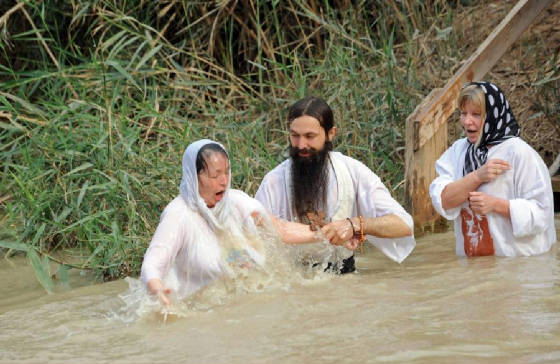|

We news junkies are already aware of most of this, but many folks are unawares, or are in denial. The Bible passage below speaks of "the mystery of iniquity." I
believe the "mystery of iniquity" is very much what we are seeing in this amassing of evil against
us. The passage also speaks of the "that man of sin be revealed, the son
of perdition." This person is generally called the Antichrist. Note
also the tremendous deception God will send on those who reject his love, in the person of the Savior, Jesus Christ. 1 Now we beseech you, brethren, by the coming of our Lord Jesus Christ, and by our gathering together unto him, 2 That ye be not soon shaken in mind, or be troubled,
neither by spirit, nor by word, nor by letter as from us, as that the day of Christ is at hand. 3 Let no man deceive you by any means: for that day
shall not come, except there come a falling away first, and that man of sin be revealed, the son of perdition; 4 Who opposeth and exalteth
himself above all that is called God, or that is worshipped; so that he as God sitteth in the temple of God, shewing himself
that he is God. 5
Remember ye not, that, when I was yet with you, I told you these things? 6 And now ye know what withholdeth that he might be revealed in
his time. 7 For the
mystery of iniquity doth already work: only he who now letteth (is blocking) will let, until he be taken
out of the way. |
 |
|

8 And then shall that Wicked
be revealed, whom the Lord shall consume with the spirit of his mouth, and shall destroy with the brightness of his coming: 9 Even him, whose coming is after the working of Satan
with all power and signs and lying wonders, 10 And with all deceivableness of unrighteousness in them that perish; because they received not the
love of the truth, that they might be saved. 11 And for this cause God shall send them strong delusion, that they should believe a lie: 12 That they all might be damned who believed not
the truth, but had pleasure in unrighteousness. 13 But we are bound to give thanks alway to God for you, brethren beloved of the Lord, because God
hath from the beginning chosen you to salvation through sanctification of the Spirit and belief of the truth: 14 Whereunto he called you by our gospel, to the obtaining
of the glory of our Lord Jesus Christ. 15
Therefore, brethren, stand fast, and hold the traditions which ye have been taught, whether by word, or our epistle. 16 Now our Lord Jesus Christ himself, and God, even
our Father, which hath loved us, and hath given us everlasting consolation and good hope through grace, 17 Comfort your hearts, and stablish you in every
good word and work. The Geneva Bible uses "the departing" in place of "a falling away first," in verse 3, King James Bible. I believe, all things considered, that it is the presence of the Christian Church,
with its indwelling Holy Spirit that is blocking the appearance of the man of sin. Thus, the rapture must take place, removing the Church, before the man of sin can appear. We should all be praying "Lord Jesus come quickly," (Rapture us) as we see
these evils building against. God can use a word in several
of its meanings simultaneously. In the case of verse 3,
the departure of the Church, and a general departure from the true faith, which we see happening all around us now.

|
 |
|

The Mystery of Iniquity is certainly multifacited. The forces of evil are surely playing many
angles. Wikipedia's Boiling Frog article on that metaphorical idea of many small, unnoticed, incremental changes, adding cumulatively
until the startled, rudely awaking people are left with no way out of the disaster. "The
boiling frog story is a widespread anecdote describing a frog slowly being boiled alive. The premise is that
if a frog is placed in boiling water, it will jump out, but if it is placed in cold water that is slowly heated, it will not
perceive the danger and will be cooked to death. The story is often used as a metaphor for the inability or unwillingness
of people to react to significant changes that occur gradually. According to contemporary biologists the premise of the story
is not literally true; a frog submerged and gradually heated will jump out. However, some 19th-century
experiments suggested that the underlying premise is true, provided the heating is sufficiently gradual The
boiling frog story is generally told in a metaphorical context, with the upshot being that people should make themselves aware
of gradual change lest they suffer eventual undesirable consequences. This may be in support of a slippery slope argument.
It is also used in business to illustrate the idea that change needs to be gradual to be accepted. The expression "boiling
frog syndrome" is sometimes used as shorthand for the metaphor. The story has been retold many times and used to
illustrate many different points. It has been used to warn about diverse phenomena, for example: in 1960 about sympathy towards
the Soviet Union during the Cold War; in 1980 about the impending collapse of civilization anticipated by survivalists; in
the 1990s about inaction in response to climate change and staying in abusive relationships. It has also been used by libertarians
to warn about slow erosion of civil rights. In the 1996 novel The Story of B,
environmentalist author Daniel Quinn spends a chapter on the metaphor of the boiling frog, using it to describe human history,
population growth and food surplus. Pierce Brosnan's character Harry Dalton mentioned it in the 1997 disaster movie Dante's
Peak in reference to the accumulating warning signs of the volcano's reawakening. Al Gore used a version of the story
in his presentations and the 2006 movie An Inconvenient Truth to describe ignorance about global warming. In his
version the frog is rescued before it is harmed. In philosophy the boiling frog story has been used as a way of explaining
the sorites paradox. This paradox describes a hypothetical heap of sand from which individual grains are removed one at a
time, and asks if there is a specific point when it can no longer be defined as a heap." |
 |
|

"Several experiments involving
recording the reaction of frogs to slowly heated water took place in the 19th century. In 1869, while doing experiments searching
for the location of the soul, German physiologist Friedrich Goltz demonstrated that a frog that has had its brain removed
will remain in slowly heated water, but his intact frogs attempted to escape the water. Other experiments showed that
frogs did not attempt to escape gradually heated water. An 1872 experiment by Heinzmann demonstrated that a normal frog would
not attempt to escape if the water was heated slowly enough, which was corroborated in 1875 by Fratscher. Goltz raised
the temperature of the water from 17.5 °C to 56 °C in about ten minutes, or 3.8 °C per minute, in his experiment
which prompted normal frogs to attempt to escape, whereas Heinzmann heated the frogs over the course of 90 minutes from about
21 °C to 37.5 °C, a rate of less than 0.2 °C per minute. One source from 1897 says, "in one experiment the
temperature was raised at a rate of 0.002°C per second, and the frog was found dead at the end of 2½ hours without
having moved." In 1888 William Thompson Sedgwick explained the apparent contradiction between the results of these
experiments as a consequence of different heating rates used in the experiments: "The truth appears to be that if the
heating be sufficiently gradual, no reflex movements will be produced even in the normal frog; if it be more rapid, yet take
place at such a rate as to be fairly called 'gradual', it will not secure the repose of the normal frog under any circumstances". Modern
sources tend to dispute that the phenomenon is real. In 1995, Professor Douglas Melton, of the Harvard University Biology
department, said, "If you put a frog in boiling water, it won't jump out. It will die. If you put it in cold water, it
will jump before it gets hot—they don't sit still for you." Dr. George R. Zug, curator of reptiles and amphibians
at the National Museum of Natural History, also rejected the suggestion, saying that "If a frog had a means of getting
out, it certainly would get out." In 2002 Dr. Victor H. Hutchison, Professor Emeritus of Zoology at the University
of Oklahoma, with a research interest in thermal relations of amphibians, said that "The legend is entirely incorrect!".
He described how the critical thermal maximum for many frog species has been determined by contemporary research experiments:
as the water is heated by about 2 °F, or 1.1 °C, per minute, the frog becomes increasingly active as it tries to escape,
and eventually jumps out if the container allows it."
| Christian baptism, Jordan River, Israel |

|
| Baptism is the symbolic entry into Christianity for those who have embraced Jesus Christ by faith |
|
|

